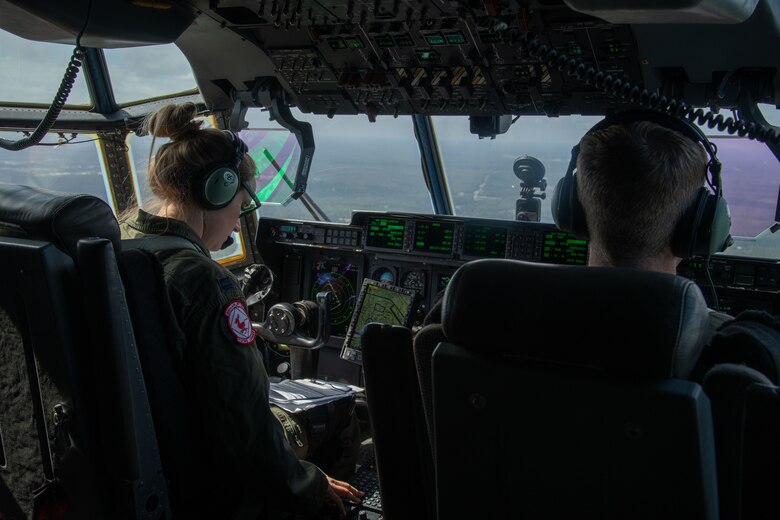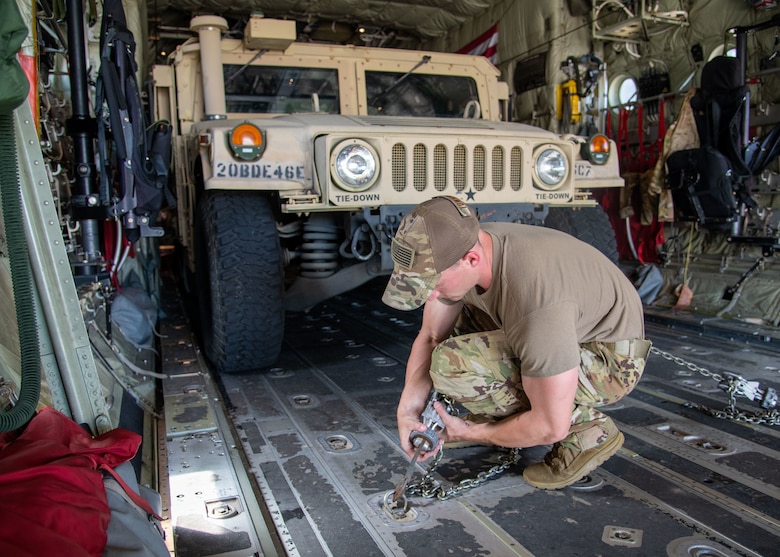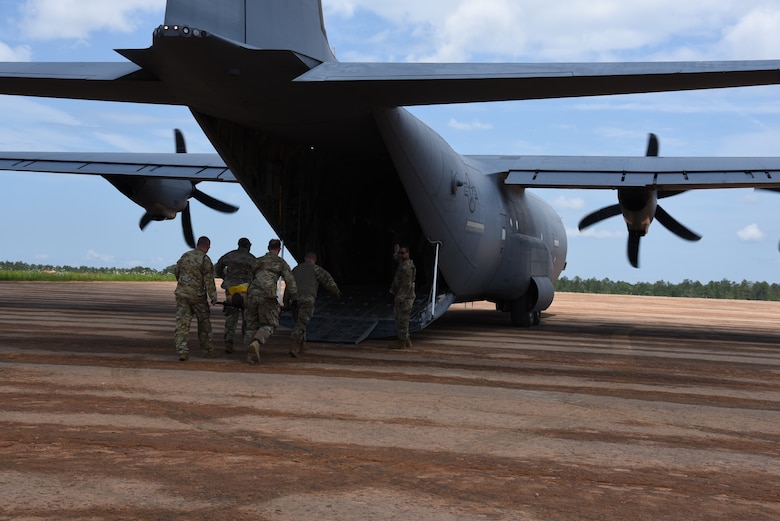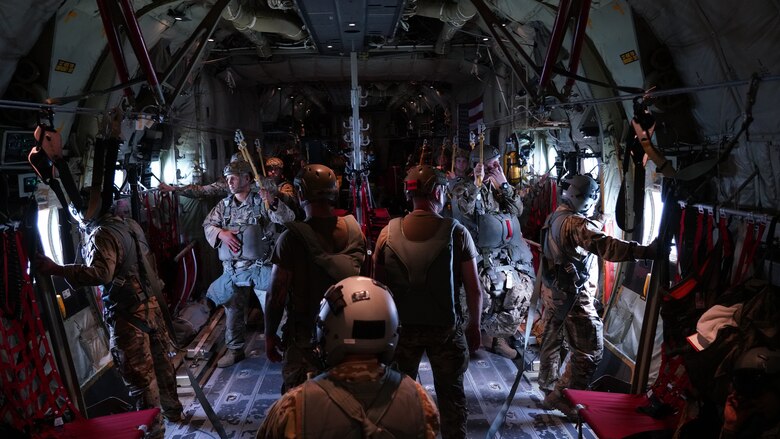Next to their vehicles, standing on a hill overlooking a dirt runway, liaison officers talk with pilots of an Air Force Reserve Command C-130J Super Hercules via a secure communications radio that they have set up at the Geronimo Landing Zone, to bring them in for a landing as part of exercise Voyager Shield.
"Voyager Shield was hosted by the 621st Air Mobility Advisory Group," said Lt. Col. Timothy Weiher, 815th Airlift Squadron assistant director of operations. "Our role was to provide the majority of the airlift support, May 25-27, to meet their needs for the exercise, which helped us meet some of our training objectives that we cannot get during our normal daily training missions."
One of those training needs was to be able to communicate with landing zone and drop-zone controllers via secure communications.
That controller is an Air Mobility Liaison Officer, or AMLO. They are Air Force rated pilots and navigators that come from mobility platforms, such as KC-10 Extenders, KC-135 Stratotankers, C-5 Galaxies, C-17 Globemaster IIIs, and C-130 Hercules; who are integrated with U.S. Army and U.S. Marine Corps units and act as liaisons between ground and air forces. The AMLOs translate the Army and Marine requirements to Air Force "speak" and back.
Maj. Andrew S. Wagner, 621st Mobility Support Operations Squadron AMLO, said, "One part of our job as liaisons between air and ground units is to control LZs (landing zones) and DZs (drop zones) for the ground units in fairly austere locations, and we can't do that without having aircraft, so having the 815th (AS) come here helps us with our training."
Some of the training needs the 815th AS, or Flying Jennies, were looking to meet included loadmaster-specific training, such as personnel drops and training with rolling cargo.
For the rolling cargo, they loaded two Humvees, provided by the 46th Engineering Battalion, Forward Support Company, at Joint Readiness Training Center and Fort Polk.
The Jennies then flew to the Geronimo LZ to do austere environment training, so they can be ready for deployment and safely complete a quick onload/offload of cargo before the aircraft has to take off again.
Once on the ground at Geronimo LZ, with the C-130J engines still running, the loadmasters directed Humvee drivers, Army Spc. Tyler Rempert and Pfc. Jonathan Havens, both 46th EN BN, FSC, out of the aircraft and then loaded one Humvee back onto the aircraft for a few assault landings.
Most of the other assets were provided by the 621st AMAG, with the exception of the C-130Js, which provided about 60% of the airlift, according to Capt. Drew Sumner, 621st MSOS AMLO.
"With the 815th AS coming in here, it facilitated all of our LZ and DZ work; plus without the Hercs (C-130J Super Hercules) in here, this would have been a much smaller and less impactful exercise," Sumner said.
Weiher said that for this three-day exercise they were able to get approximately 20% to 25% of the pilots training time for some of their tactical-training requirements, and this event was ideal because it covered training on semi-prepared runway operations or dirt landing zones, and secure communications with LZ and DZ controllers.
"For AMLOs, this training is especially useful because normally, I would have to be deployed to get this many repetitions with landings at one time," Wagner said. "But thanks to the aircrew that are so willing to come out here for extended periods of time, it really does help to get the extra training they need to prepare for deployment."
Other training that occurred during Voyager Shield included engine-running onload and offload of aeromedical evacuation simulated patients from both a vehicle and a smaller aircraft, in this case a C-208 Caravan, which is a similar type of aircraft used by allied forces.
"Being fairly close, this exercise gave us the opportunity to conduct different training that we normally don't see," Weiher said. "And it was not one where we had to actually deploy the unit to participate, we could fly from home station, get the training and return."

Capt. Leesa Froelich, aircraft commander, and Capt. Montgomery Sloat, copilot, both of the 815th Airlift Squadron "Flying Jennies" at Keesler Air Force Base, Miss., prepare to land at the Joint Readiness Training Center and Fort Polk, La., May 25, 2021. The 815th AS provided airlift and airdrop support during Voyager Shield, an exercise hosted by the 621st Air Mobility Advisory Group, May 25-27. (U.S. Air Force by Staff Sgt. Kristen Pittman)

Tech. Sgt. Christopher Townsley, 815th Airlift Squadron loadmaster at Keesler Air Force Base, Miss., tightens chains to secure a High Mobility Multipurpose Wheeled Vehicle onto a C-130J Super Hercules during Voyager Shield, an exercise hosted by the 621st Air Mobility Advisory Group at the Joint Readiness Training Center and Fort Polk, La., May, 25, 2021. The exercise included 621st AMAG, the Army JRTC, Fort Polk and 403rd Wing Air Force Reserve personnel, and took place May 25-27. The 815th AS required tactical training consisting of loading and off-loading of rolling cargo and personnel air drops. (U.S. Air Force by Staff Sgt. Kristen Pittman)

The 815th Airlift Squadron trained with aeromedical evacuation personnel, completing engine-running on and offload of patients during Voyager Shield, an exercise hosted by the 621st Air Mobility Advisory Group at the Joint Readiness Training Center and Fort Polk, La., May 25-27, 2021. The exercise provided the 815th AS required tactical training for the pilots and loadmasters while they provided airlift and airdrop support. Loadmaster-specific training included rolling stock loading/unloading in both normal and engine-running operations, patient loading with engines running and personnel drops. (U.S. Air Force photo by Jessica L. Kendziorek)

Joint Readiness Training Center Operation Group Airborne parachutists standby for their static line jump from a C-130J Super Hercules May 27, 2021. The 815th Airlift Squadron, known as the "Flying Jennies," provided airlift and airdrop support during Voyager Shield, an exercise hosted by the 621st Air Mobility Advisory Group at the Joint Readiness Training Center and Fort Polk, La., May 25-27. (U.S. Air Force photo by Jessica L. Kendziorek)






